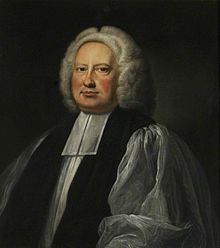John Potter (bishop)
|
The Most Reverend and Right Honourable John Potter |
|
|---|---|
| Archbishop of Canterbury | |
 |
|
| Installed | 1737 |
| Term ended | 1747 |
| Predecessor | William Wake |
| Successor | Thomas Herring |
| Other posts | Bishop of Oxford (1715–1737) |
| Personal details | |
| Born | c. 1674 Wakefield, Yorkshire |
| Died | 10 October 1747 |
| Spouse | Elizabeth Venner |
| Alma mater | University College, Oxford |
John Potter PC (c. 1674 – 10 October 1747) was Archbishop of Canterbury (1737-1747).
He was the son of a linen-draper at Wakefield, Yorkshire. At the age of fourteen he entered University College, Oxford, and in 1693 he published notes on Plutarch's De audiendis poetis and Basil's Oratio ad juvenes. In 1694 he was elected fellow of Lincoln College, Oxford and in 1697 his edition of Lycophron appeared. It was followed by his Archaeologia graeca (2 vols. 8vo, 1697–1698), the popularity of which endured till the advent of Dr William Smith's dictionaries. A reprint of his Lycophron in 1702 was dedicated to Graevius, and the Antiquities was afterwards published in Latin in the Thesaurus of Gronovius.
Besides holding several livings he became, in 1704, chaplain to Archbishop Tenison, and shortly afterwards was made chaplain-in-ordinary to Queen Anne. From 1708 he was Regius Professor of Divinity and canon of Christ Church, Oxford; and from 1715 he was Bishop of Oxford. In the latter year appeared his edition of Clement of Alexandria. In 1707 he published a Discourse on Church Government, and he took a prominent part in the controversy with Benjamin Hoadly, Bishop of Bangor. Even though Potter was a notable Whig, he was a High Churchman and had opposed Hoadly.
...
Wikipedia
